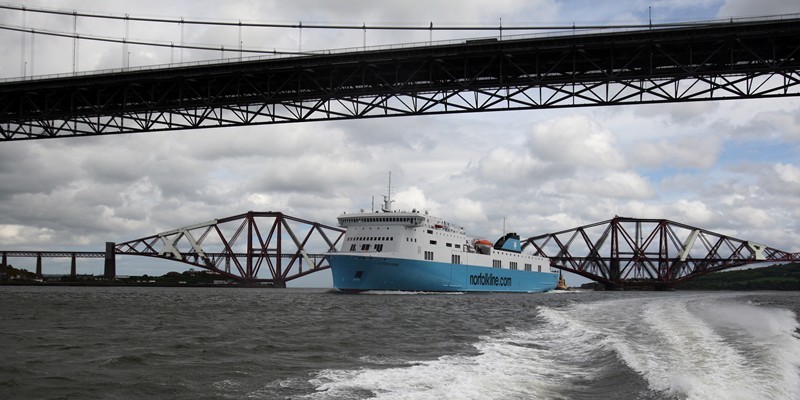Any loss of the freight ferry service running between Scotland and Europe would be catastrophic, experts have warned.
Fears have been raised that DFDS Seaways might be planing to pull the plug on the “vital” route, which runs from Rosyth.
A pull-out would hit haulage businesses and their customers throughout Scotland.
Among those alarmed by the prospect is Alex Macaulay, partnership director of the South East of Scotland Transport Partnership (SEStran).
“This is an absolutely critical service and it is essential that it is retained,” he warned. “It is vital, not just for Fife or the east of Scotland, but for the whole of the country.”
Rumours began to circulate that all was not well when DFDS reduced the number of weekly sailings from four to three. However, Mr Macaulay insists all is not lost.
“Obviously any loss of the service would be a major concern but is by no means inevitable,” he said.
“DFDS have insisted they have no plans to axe the service, but it does seem to be somewhat fragile.
“Within months of taking over the route (from Norfolk Line) they reduced the frequency of sailings by 25%. Of course that raises concerns.”
Hauliers in Scotland would face a road trip to Newcastle or Hull should the only Scottish service be scrapped.
“We are concerned that DFDS run a Newcastle to Brugges service, so through their Rosyth operations they are basically competing with themselves,” Mr Macaulay continued.
“In itself that is not always a bad thing but if we do get into a situation where only one is deemed to be viable then the one at risk would certainly be the Rosyth to Zebrugge service.”Discussion possibleMr Macaulay insists a bright future is still possible and SEStran officials are setting up high-level talks with businesses and politicians from both sides of the North Sea in a bid to encourage more firms to use the Scottish service.
The organisation is also set to hold discussions with DFDS.
“We want to identify more opportunities for companies, both in Scotland and on the continent,” Mr Macaulay said. “There is uncertainty over the future but if more freight firms begin to use the ferry it is more likely to consolidate the service.”
Mr Macaulay pointed out that forcing hauliers to travel to ports south of the border would have a detrimental impact on the environment-something the Scottish Government is desperate to avoid.
He also said that relatively simple measures, such as tweaks to timings, could have a positive impact on the number of companies using the service.
“One major haulier was giving the route a lot of business but stopped using it as the timings were not right,” Mr Macaulay continued. “If we can get the right people to speak to each other this is the kind of thing that could perhaps be addressed.”
Alan Hull, route director of DFDS Seaways, rejected rumours the service was in terminal decline and that his firm was looking for a way out.
He insisted the decision to reduce sailings reflected a lower-than-expected demand in recent months.
“We are committed to the route but obviously we need to make it profitable,” Mr Hull said. “If it is not running profitably we will have to change the schedule.
“We reduced the services due to the volume of custom, but I do not know where the suggestions we are running down the services have come from.”
